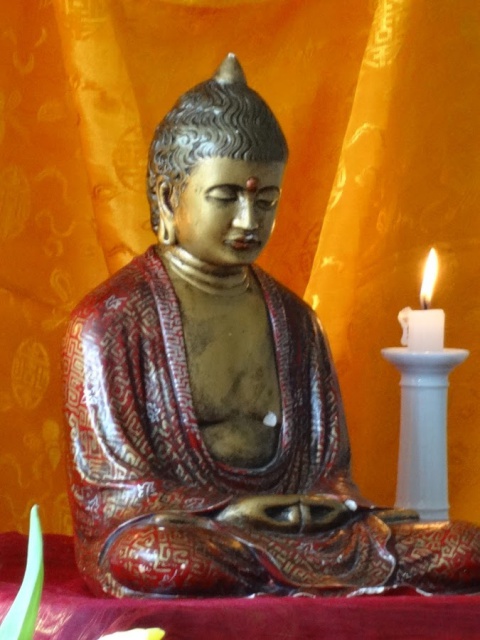As dusk descends passive observation allows one to see the beauty beyond the surface dreariness of the day. Darkness begins to envelop the land, and a nearly full moon shines through the hazy skies above the branches of the sycamores. There is mystery.
The space and silence of methodless meditation allow insight and renewal. In negating the observer through the action of simple watchfulness, life springs forth around and within one. The spaces between thoughts widen, and the brain quiets and clears itself of thought-consciousness.
Why are meditation methods and techniques a mistake? Because they are fabricated by thought, and you cannot use thought to quiet the mind and go beyond thought. One has to allow the contents of the mind and heart the freedom to flow unimpeded by judgment, evaluation and effort. Thought is a stream that only stops when it is undividedly and intensely observed as a whole.

Meditation involves taking the time to sit still and observe, without employing time to reach a self-projected goal. In doing so, one finds a space opens up between thoughts. Strong emotions often arise, seemingly for no reason. But by passively observing them in the same way one watches a roiling stream go by, one passes through them with insight and greater self-understanding.
When passive observation completely negates the illusion of the separate observer, attention gathers its own momentum, and the mind spontaneously falls silent. The present is no longer overshadowed by the past, and one effortlessly leaves the stream of thought-consciousness, which is the past.
Undirected attention acts like a laser, burning all the way through the thick material of thought. Therefore right observation ends the infinite regress of the observer and time, allowing attention to gather and the timeless to be.
Consciousness, as we usually know it, is an accretion of memory. As we grow older, the mind is like a windowpane that becomes caked with grime, allowing less and less light to pass through. Passive observation growing into undirected attention in the mirror of nature cleans the windowpanes.
Returning to one’s work and routines, underlying material of memory and unseen content of emotions seep back into the space opened up by meditation. The mind falls back into the habit of thinking and associating—the ebb and flow of the past. But one is changed, and cannot completely go back to operating in terms of thought, memory and association.
What then, is “enlightenment?” Does illumination occur when effortless attention remains constant, so that the material of the past cannot leach back into present? Does the illumined person (there have been very few in human history that have attained that level of awareness) live in a steady state of awareness and insight? One thing is certain: meditation is not a matter of will, effort or choice, but rather of seeing and being.
This is why I don’t favor transplanted Buddhist conceptions of meditation and illumination, since our linguistic and conceptual frameworks arise from the culture and history in which we live. Ours is a scientific and material age, and we need a new language for “enlightenment” in these terms. Besides, tradition impedes illumination, and can never ignite it.

Buddhism is an Eastern tradition dating from the time of Siddhartha Gautama, who lived about 2500 years ago. Very little is known about the life of Gautama, and his teachings were first part of an oral tradition, not committed to writing until 400 years after his death.
Though many pretend to take on a mantle of authority with regard to Gautama¹s teachings, or Buddhism in general, it is a false attitude, and not just because, like Jesus, there is inherent uncertainty about what Buddha actually taught. Rather, authority where spiritual matters is concerned is utterly antithetical to inward learning and freedom.
Whatever our tradition, history and background, transformation and illumination aren’t possible in the individual without self-knowing. And a revolution in human consciousness is possible when individuals awaken all over the world, irrespective of tradition.
Globalization, technology and a planetary ecological crisis make psychological revolution imperative, and possible like no other time in human history.
Martin LeFevre
Lefevremartin77 at gmail.com

